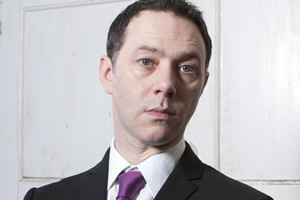
Reece Shearsmith
- 55 years old
- English
- Actor and writer
Press clippings Page 58
Stag preview
The hunters become the hunted as each one is horribly eliminated, one gobby moron at a time.
Sara Wallis, The Mirror, 27th February 2016The second series of this superb and unique comedy from Reece Shearsmith was always going to make the list. The first series was one of the biggest highlights of 2014 meaning this second series of the standalone comedy stories had a lot live up too. Whilst some episodes failed to reach the high standards set by the first series, special mention must go to Sheridan Smith's episode and a deeply engrossing episode set in a call centre.
The Custard TV, 18th December 2015Inside No. 9 to return for Series 3
Inside No. 9, the comedy anthology series created by and starring Reece Shearsmith and Steve Pemberton, is to return to BBC Two for a third series.
British Comedy Guide, 7th October 2015Reece Shearsmith's favourite TV anthology episodes
To celebrate the release of Season 2 on DVD (out now), Cult Box asked Reece Shearsmith to select some of his favourite ever TV anthology episodes...
William Martin, Cult Box, 19th May 2015Cast announced for BBC comedy thriller Stag
Tim Key, Reece Shearsmith, Rufus Jones and Sharon Rooney are amongst the comic actors joining Jim Howick as BBC Two's Stag begins filming.
British Comedy Guide, 18th May 2015You should be watching: Inside No. 9
Occupying a Tuesday evening timeslot on BBC Two, it was perhaps inevitable that Inside No. 9 didn't received the recognition it deserves. After only two short series, Reece Shearsmith and Steve Pemberton have succeeded in creating one of the most original and well-written British TV series in years.
Andrew McGee, The Boar, 10th May 2015Radio Times review
There's a star turn from Reece Shearsmith as a demented fishmonger who cadges a lift to work with John and Kayleigh as this curious little observational comedy trundles along.
Shearsmith plays Ray, a colleague of the pair at the superstore but no one wants anything to do with him because he reeks of fish. In any event Kayleigh isn't at her best after a drunken night at a friend's farewell party where she drank a few too many "cheeky Vimtos", which, she tells John, "are all the rage in Basra".
There are signs that John (Peter Kay, who co-wrote and directed) is growing quite keen on his car-sharer, and the pair are developing a sweet and funny relationship forged to the cheesy hits of "Forever FM".
Alison Graham, Radio Times, 6th May 2015Reece Shearsmith on crafting Inside No. 9
Digital Spy spoke to series co-creator, writer, performer and first-time director Shearsmith about how series two was crafted - and whether a third might be in the works.
Morgan Jeffery, Digital Spy, 4th May 2015Inside No. 9 ended its run with a story that, I kid you not, had me waking up and fretting in the middle of the night.
A timid girl was shown into the house of a renowned medium. No sooner had their consultation began than a series of terrifying events took place. A candle shot into four-foot flames as the voice of a growling demon issued forth from the smoking mouth of the frail lady medium. Then the lights went on and the whole thing was revealed to be a stunt for a particularly cruel type of reality show called Scaredy-Cam.
The ugliness lingered, ghost-like, even when the cameras had gone off. The host, played by Reece Shearsmith, was an arrogant beast, the medium was a self-obsessed prima donna and the production crew were, at best, indifferent.
When a new victim was ushered in, though, there were spooky happenings that no one seemed to have planned. Slowly, without declaring its hand until the final shot, the half-hour tale built into horror (but a moral horror) where the unkind got their desserts.
You could even say that the modern, callous world of reality TV got a roasting from a format truer of a bygone age, something akin to Play For Today or Armchair Theatre.
However you see it, however it unsettles you, this show is a faith-restorer for those who love TV drama.
Matt Baylis, The Daily Express, 30th April 2015Series two of Reece Shearsmith and Steve Pemberton's darkly comic anthology comes to a close with a suitably spooky instalment. Tina, an unassuming phone shop employee, enters a looming Victorian villa bearing the titular number, following an instruction to visit the mysterious medium Madam Talbot. Once inside, it soon becomes clear that unseen forces have been preparing for her visit. A fitting end to a second series that has excelled at times. One can but hope a third set of nines is to follow.
Mark Jones, The Guardian, 29th April 2015